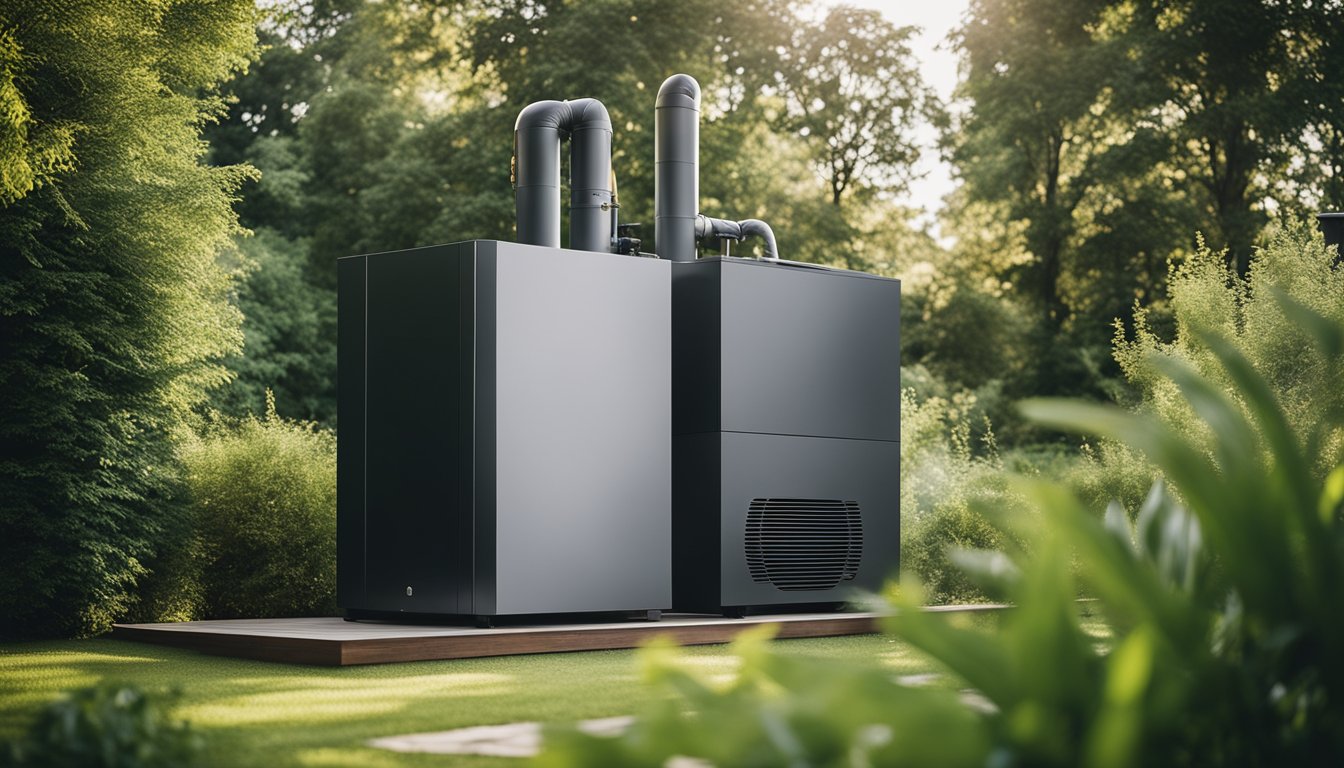Late updated: 15 Oct 2024 11:10
Written by: Eleanor Hartman
Home Benefits Of Switching To Hydrogen Boilers In The UK: A Sustainable Heating Solution
Switching to hydrogen boilers in the UK offers both environmental and economic benefits for homeowners. With pressing needs to address climate change, alternative energy solutions like hydrogen are paving the way for a sustainable future. By embracing this innovative technology, we can reduce carbon footprints and contribute to the decarbonisation efforts necessary for achieving net zero emissions. The most compelling advantage is the significant reduction in carbon emissions when compared to traditional natural gas systems.

Incorporating hydrogen boilers into our homes means adapting to a cleaner, more sustainable energy source. These boilers function similarly to conventional gas boilers but rely on hydrogen, which is a cleaner fuel option. As the UK moves towards integrating higher percentages of hydrogen into the energy grid, these systems promise to become increasingly viable. This shift aligns with broader national goals for sustainability and energy efficiency.
The transition to hydrogen boilers may come with questions about costs and implementation. However, it's a change that supports a long-term vision of energy independence and environmental stewardship. As we explore the benefits, it becomes clear that this technology not only aligns with the UK's climate goals but also represents a practical choice for modern homes.
Key Takeaways
- Hydrogen boilers significantly reduce carbon emissions.
- They support the decarbonisation goals of achieving net zero.
- Adoption in homes is a step towards sustainable energy solutions.
The Role of Hydrogen in Achieving Net Zero Emissions
As we look towards the UK's net zero target by 2050, hydrogen emerges as a key player. It offers potential as a low-carbon energy alternative, particularly in heating our homes, contributing to the broader decarbonisation effort.
Understanding Hydrogen's Potential
Hydrogen offers significant benefits in reducing carbon emissions. When used as a fuel, it produces water instead of carbon dioxide, the main greenhouse gas. Green hydrogen is produced through electrolysis, a process using renewable energy to split water into hydrogen and oxygen. This contrasts with grey hydrogen, which results from fossil fuels and has associated emissions.
The adoption of hydrogen can help transition away from gas boilers, traditionally reliant on fossil fuels. We see hydrogen as a versatile energy carrier, especially in sectors challenging to decarbonise, such as heating.
Comparison With Traditional Natural Gas Heating
When comparing hydrogen heating with traditional natural gas boilers, a few critical distinctions arise. Hydrogen can significantly reduce reliance on fossil fuels and mitigate greenhouse gas emissions. Natural gas, while efficient, is a major carbon emitter.
Hydrogen boilers operate similarly to their natural gas counterparts but require adaptations in design and fuel infrastructure. The transition to hydrogen poses challenges, such as the current limited production and distribution capabilities. This shift demands strategic investment and planning to accommodate hydrogen’s unique characteristics while ensuring reliable and efficient heating.
Hydrogen Heating Versus Other Renewable Alternatives
Hydrogen heating is often compared with technologies like heat pumps, including both air source and ground source. While heat pumps extract renewable energy from the environment, hydrogen offers flexibility and storage advantages, crucial during peak demand. Each method of heat decarbonisation has pros and cons dictated by geographical, economic, and infrastructure factors.
In particular, heat pumps face barriers in regions with extreme climates and require significant electricity input. Conversely, hydrogen can seamlessly integrate with existing heating systems, albeit at the cost of developing new supply chains. By integrating hydrogen with other renewables, we can leverage its unique benefits, contributing to a diverse and resilient energy system in the UK.
Adopting Hydrogen Boilers in UK Homes

Adopting hydrogen boilers offers a pathway to sustainable, low-carbon heating in the UK. This involves transitioning from traditional gas systems, considering practical requirements for installation and infrastructure, and understanding costs and available incentives.
Transitioning From Gas to Hydrogen Boilers
Switching from gas to hydrogen boilers represents a significant change in home heating. Currently, hydrogen-blend boilers can run on a mix of 20% hydrogen and 80% natural gas. This is an interim step before transitioning to boilers that could run on 100% hydrogen.
The gas network would need upgrades to accommodate enhanced hydrogen supply. Those opting for a hydrogen-ready boiler will be better positioned as this technology advances. Overall, choosing a hydrogen-ready boiler now is a strategic decision to future-proof home heating systems against potential gas boiler bans planned for the future.
Practical Considerations and Infrastructure
Incorporating hydrogen boilers into homes also involves evaluating practical aspects of installation and infrastructure. Hydrogen-ready boilers need to be compatible with existing systems, such as radiators and water heaters. Attention must be given to hydrogen storage tanks, which are necessary to maintain consistent supply.
Developing an effective hydrogen infrastructure is crucial. This includes expanding the hydrogen grid connection to ensure a stable and reliable fuel supply. Upgrading the current gas supply systems to handle increased hydrogen levels is essential. Understanding these logistics will help homeowners make informed decisions about their heating systems.
Cost Implications and Incentives
The cost of installing hydrogen boilers is a concern, with prices expected to align with traditional gas combi boilers. Homeowners should anticipate upfront boiler installation costs as well as ongoing fuel costs. Nevertheless, energy efficiency improvements could offset some expenses over time.
Moreover, government policies and support could play a key role. Government incentives, such as grants or rebates, may become available to encourage adoption of hydrogen technology. These incentives can significantly reduce financial barriers and promote a shift towards lower carbon emissions in home heating. Staying informed about these possibilities ensures we can make cost-effective choices.
Frequently Asked Questions

Hydrogen boilers are emerging as a potential game-changer in home heating. We examine their benefits and drawbacks, safety aspects, cost implications, and more to aid British homeowners in making informed choices.
What are the advantages and disadvantages of hydrogen boilers for home heating?
Hydrogen boilers produce zero carbon emissions directly during operation, benefiting the environment. They can integrate into existing heating systems with minimal disruption. The potential drawbacks include higher fuel costs compared to natural gas and the current limitations in hydrogen infrastructure.
How does the efficiency of hydrogen boilers compare to that of heat pumps?
Hydrogen boilers are similar in efficiency to traditional gas boilers, while heat pumps generally offer higher energy efficiency by extracting ambient heat. However, the actual efficiency can vary based on house insulation, climate, and boiler technology.
Is it safe to utilise hydrogen for residential heating purposes?
Using hydrogen for heating is considered safe, given rigorous testing and safety regulations. Hydrogen poses similar safety challenges as natural gas, such as flammability, which are mitigated through proper system design and maintenance.
What are the estimated costs associated with installing and operating a hydrogen boiler?
Hydrogen boilers may involve similar installation costs to conventional boilers. However, running costs could be significantly higher, with projections reaching around £0.19/kWh by 2030. This is considerably more than the projected cost of natural gas, estimated at £0.08/kWh.
Can hydrogen be a viable replacement for natural gas in British homes?
Hydrogen has significant potential as a clean energy alternative to natural gas. While the transition is under development, hydrogen blends can currently be utilised in some boilers. Full reliance on hydrogen would require substantial infrastructure enhancements.
What are the expected developments in the UK regarding gas boiler alternatives after 2025?
Post-2025, the UK anticipates increasing investment in renewable energy and alternative heating solutions, such as hydrogen and heat pumps. This shift aims to meet carbon reduction targets and enhance energy security, pushing forward the adoption of more sustainable home heating technologies.